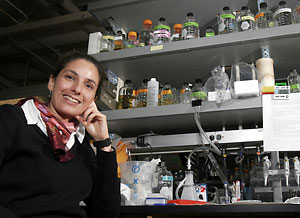UC Berkeley Web Feature
UC Berkeley's MacArthur fellows
Choanoflagellates may be key to earliest multi-celled ancestors
Nicole King, assistant professor of integrative biology and of molecular and cell biology
20 September 2005
Over 600 million years ago, two cells began cooperating in what was the first step toward higher organisms like humans. King is trying to create a picture of the first multicellular animals by studying the living organism closest to that ancient ancestor – a one-celled protozoan called a choanoflagellate. With their long tails and round heads, choanoflagellates look like sperm. Only 10 microns across, they are one hundredth the size of a pencil point, King said.
 Nicole King (MacArthur Foundation photo) |
"You find them all over the planet, they live in both marine and freshwater environments, they are very easy to grow in the laboratory, and they are pretty cute," she said. "They swim around in a frenetic way; you could spend hours just looking at them."
Her real reason for studying them, however, is that they probably contain many of the same proteins as that first multi-cellular organism. She wants to know what the primordial function of these molecules was. She has identified two types of molecules that appear to be vestiges of these early creatures.
"It's not possible to peer into the fossil record for a trace of events that led to the origin of animals – these organisms are just not preserved," she said. "What we have been doing is trying to identify a living organism that essentially preserves the history of the state of the ancestor of animals. Choanoflagellates hold a key position in terms of their evolutionary relationship to animals."
"Features of their biology that they share with animals are going to be things that were actually in place before animals evolved," she added. "One of the surprising findings we have made is that signaling and adhesion genes actually were present before the origins of animals, because we can find them in choanoflagellates. We are studying their functions in choanoflagellates so that we can learn about the molecular genetics of the first animals and the unicellular ancestors to living animals."
Raised in Reno, Nevada, Nicole King received a B.S. in 1992 from Indiana University, Bloomington, and an A.M. (1996) and a Ph.D. (1999) from Harvard University. King held a postdoctoral fellowship at the University of Wisconsin, Madison, until joining the UC Berkeley faculty in 2003. She is also a faculty affiliate of the UC Berkeley Center for Integrative Genomics.
King lives with her husband, consultant Tim Weitzel, and their dog Ruby in Berkeley.
Related links:

